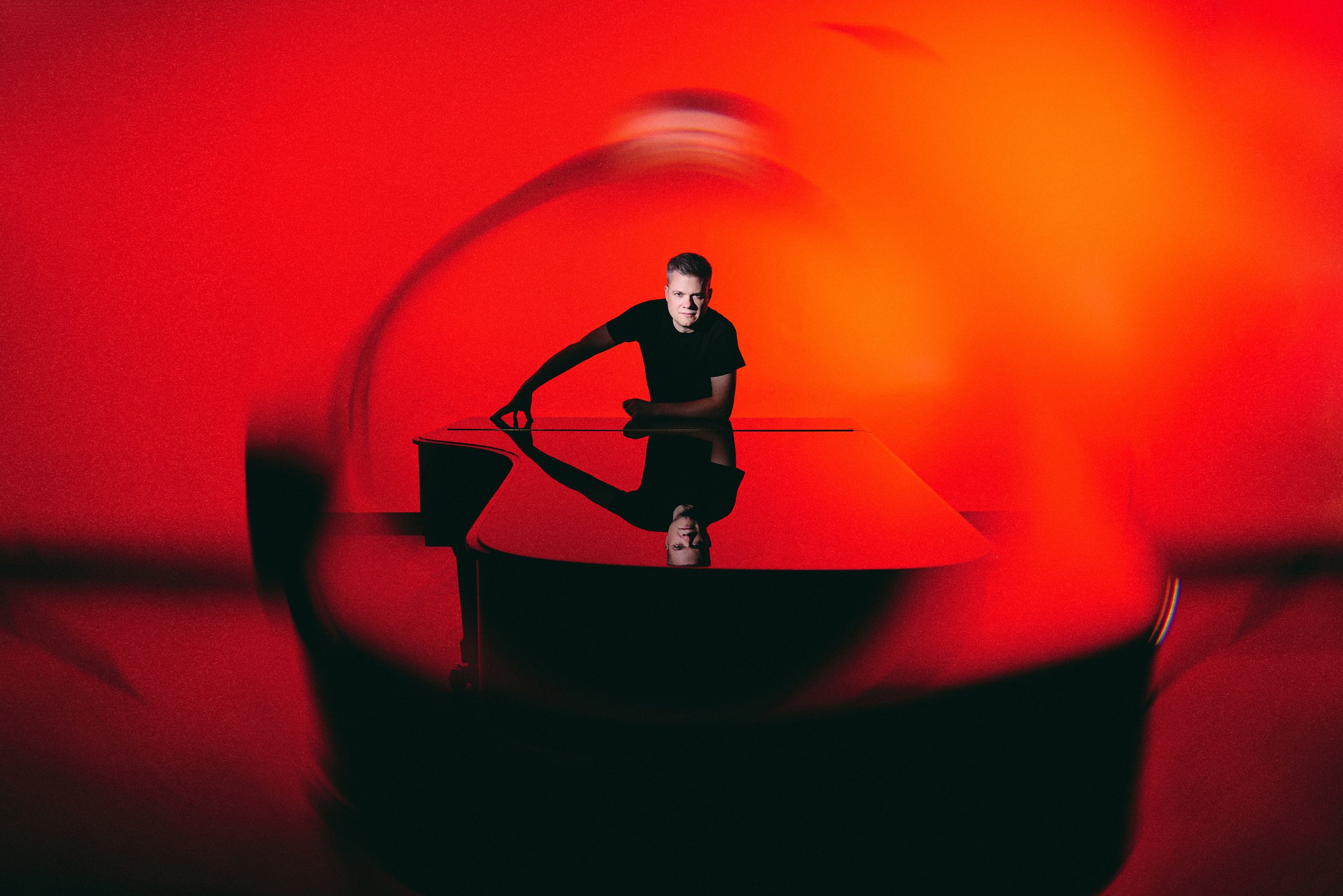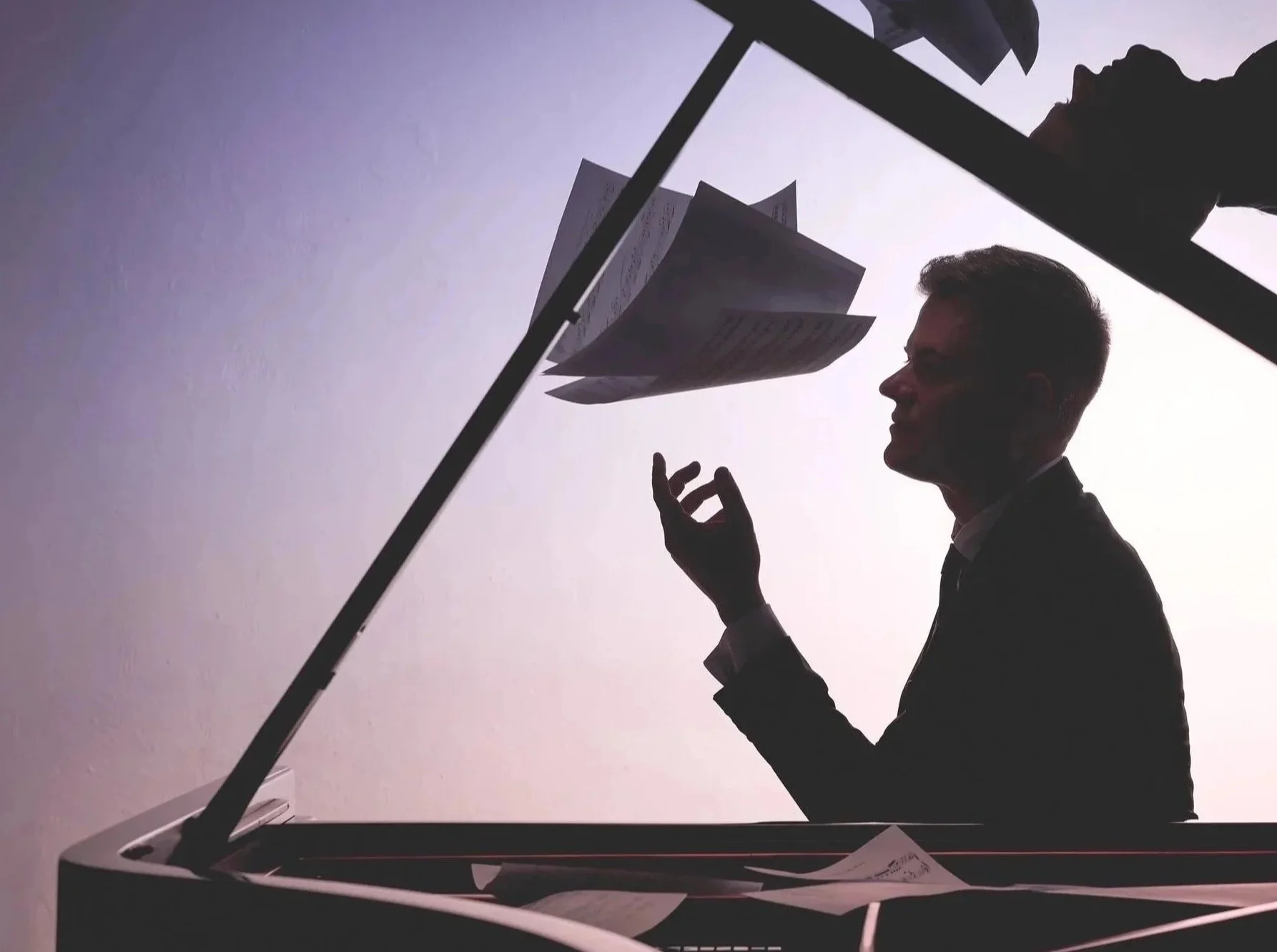
Time Unraveled
After a year in development, I’m excited to announce my latest project:
TIME UNRAVELED
Spiraling through past, present, and future on Steinway Spirio
What happens when a pianist battles his younger self — or his own piano? Step into a musical hall of mirrors where pianist Greg Anderson transforms the Steinway Spirio into a time machine, staging conversations across centuries. From Bach and Mozart to Amy Beach, Ligeti, and Radiohead, old music becomes new again as past, present, and future collide.
I hesitate to reveal too much, but suffice it to say, it’s a piano recital more wild than you could imagine. Find a few upcoming teasers on social media, and join me for the debut performance at Penn State on October 25.
Stars & Stripes for 8 pianos, 32 hands
Last year, I composed an over-the-top, ten-minute fantasy for 16 pianists based on John Philip Sousa’s “Stars & Stripes Forever,” commissioned by the Aspen Music Festival.
The piece uses its 160 fingers and 704 keys to create pointillistic textures of sound. Swirling clusters of notes evoke clouds, rainbows, and fireworks as the music wavers between major and minor. It’s an homage to Sousa’s tune filtered through fog and uncertainty.
I spent five impassioned months wrestling with the logistics of 16 pianists playing together. Now, I find myself wrestling with feelings for our country, yet I choose not to shelve the work in disappointment. This Fourth of July, I offer the work as both a tribute and a question mark. “Stars & Stripes: Fireworks for 8 pianos, 32 hands” is an ode to the principles of the Declaration of Independence—equality, life, liberty, and the pursuit of happiness—while acknowledging the mess of it all. It’s a celebration of our humanity and a reminder that music can bring us together, even as questions linger.
An ideal work for pianists and presenters planning for the USA 250th next year.
(70% of the multi-track audio recording was recorded on my 20-year-old electric keyboard and the other 30% is Sibelius Notation Software playback.)
Purchase the full score with eight duet parts here.
The incredible story of how a Ligeti etude made its way onto a football field
In 2006, I uploaded a video of “The Devil’s Staircase” (Ligeti's Etude No. 13) to YouTube. It’s a difficult, avant-garde work for solo piano... and something I never dreamt would be performed by an ensemble of brass and percussion instruments, let alone 150 young musicians performing by memory while running around a football field.
Yet a few years later, the Santa Clara Vanguard did just that. In 2011, they devoted their season to a routine inspired by the etude and video, culminating with a performance at the Drum Corps International World Championships.
In 2024, I finally watched their performance for the first time after someone posted it to YouTube. It absolutely blows my mind. This video explains how it all came to be and highlights some of the most astounding aspects of their performance.
The Santa Clara Vanguard just began their 2025 touring season with a program appropriately titled “The aVANt-GUARD” — head to their page to find a performance near you!
Cliburn Backstage 2025 + Live Performance
Thrilling! Emotional! My three weeks as the backstage host at the Cliburn International Piano Competition were all that and more. Though classical music faces its challenges, the eloquence and passion of the 28 pianists have left me energized for what lies ahead. Enjoy the five playlists on YouTube: Features, Finals, Semifinals, Quarterfinals, Prelims.
One question I asked the semifinalists as they walked off stage: What role do piano recitals play in our increasingly virtual world?
I turned their responses into a 9-minute feature and was so moved that I made my way into Bass Hall for two of the final concerto performances. After watching the webcasts backstage for three weeks, it was a revelation to join the audience in the flesh—to escape my screen, to hear and feel the energy in the hall, and to commit to a performance from beginning to end. Something magical happens when we unplug and come together as a community, in person, in real life, to watch humans perform music composed by humans.
The final segment of the feature, “Live vs. Digital,” is devoted to the differences between digital and real life experiences. It all felt a bit meta, since I was making *digital* content advocating for live performances in a room with pianists I had just watched perform online. But the conversations were a reminder why we, the webcast team, were there working so hard in the first place. Every frame, camera angle, and insight (❤️ Liz and Buddy) was chosen to amplify these artists’ voices, to make piano music resonate today, and above all, to remind us of the humanity at the heart of performance—the humanity which sometimes gets lost when we digitize the art form.
I’m SO proud of everything the backstage crew accomplished. The webcasts were magnificent. Congratulations to everyone involved! My hope is that the digital content we created has drawn you in—and will lead you to a *live* moment of your own. If you found yourself moved at all, please search for performances of these pianists (or any!) to attend in person soon.
Cliburn Competition 2025: Backstage access
Are YOU ready?
The excitement kicks off Wednesday, May 21—and I’ll be right there with you.
Throughout the competition, I’ll serve as your backstage correspondent for the Cliburn’s official webcasts and digital content. You’ll find me in the wings, greeting each pianist as they step offstage and capturing those first reactions—raw, emotional, illuminating. I’ll dive into performance surprises, unpack artistic decisions, and share the most fascinating insights, all while curating highlight reels, vignettes, and bite‑size educational clips.
In short: if you want real, behind‑the‑scenes access to the Cliburn, I’ve got you covered.
Keep an eye on Liz who will be anchoring the main desk alongside Buddy Bray. I’ll join them during jury voting to unpack the drama, discuss repertoire trends, and explore what lies ahead for the competition’s standout artists.
Whether you’re charting your own keyboard journey, following emerging talents, or simply savoring the highest levels of pianistic artistry, the truly incredible Cliburn webcast team will deliver an immersive, front‑row seat.
Backstage Tip: Don’t wait for the finals! Some of the competition’s finest moments emerge in the competition’s preliminary round, when the competitors are freshest and at their most prepared.
Mozart’s Lost Fantasy
In 2024, after immersing myself in Mozart’s completed works for piano, I turned to the hundred or so incomplete sketches he left behind. One fourteen-bar fragment in F minor (K. Anh. 32) stopped me cold: it erupts in an agitated Baroque-inspired improvisation, only to dissolve into a dreamscape of repeating notes, sour harmonies, and wistful filigree that feels decades ahead of its time, foreshadowing the Romantic piano writing of Chopin.
And then the music simply... stops.
Composed in 1789, crushed by debt, beset by illness, and facing his own mortality, Mozart’s sketch fizzles out mid-stream—its last bars swallowed by the chaos of life. No edition offers a performable realization, yet those halted measures continued to haunt me.
Rather than attempt a full completion, I became a jeweler for this musical gemstone, interweaving it with two vocal laments by Mozart. There’s Barbarina’s anguished “I’ve lost it” from The Marriage of Figaro, alongside music from Das Lied der Trennung with the lyrics, “Forgetting robs in hours what love took years to give.”
Only five percent of the Fantasy’s completion is by me; the rest is pure, passionate, transcendent Mozart. With a hint of fairy dust to bind the music, I’ve fashioned a self-portrait of Mozart at the close of his life—Mozart in conversation with himself, contemplating the universal fear that time will erase what we hold dear.
Find a performance of my completion below, more info and the score here, and my new EP “Lost & Found” on Spotify and Apple Music.
Bach: Aus Liebe will mein Heiland sterben
The Jussen brothers recorded a beautiful rendition of my arrangement of “Out of love my savior is willing to die” from Bach’s St. Matthew Passion.
From the Top show #460 + interview
What fun! I co-hosted NPR's "From the Top" this week alongside the inimitable Peter Dugan. Listen for the Alexis-Hansen Piano Duo’s take on my Sabre Dance arrangement, as well as their hilarious account of the choreographic pitfalls they faced while performing the piece.
And a big congrats to “From the Top” on celebrating their 25th anniversary! I first appeared on the show exactly 25 years ago, and the experience was nothing short of transformational. As an 18-year-old, I hadn’t considered the skills I’d need to succeed as a professional musician beyond practicing. The “From the Top” staff taught me how to be an excellent communicator about music and helped me define my musical purpose.
Please consider supporting their mission today. Here are just a few reasons:
From the Top changed my life. I know it will change future kids’ lives, expose them to a wider world, ignite their passions, and help define their purpose.
From the Top adds beauty and goodness to the world; we can never have enough of both.
Through music, we can rise above our differences to find common ground.
Interview here: Catching Up with Alum Greg Anderson
Mozart Rondo + listening guide
How do you listen to music? Do you let it wash over you? Feel it viscerally? Contemplate its inner workings?
I’m endlessly fascinated by the listening experience (see: Music Listening: an Incomplete Manifesto), and for years I’ve dreamed of creating listening guides synched to music.
This is my first attempt at such—a personal tour through Mozart’s Rondo in A minor, K. 511.
Mozart’s music tends to be “absolute music.” It’s music for music’s sake and not intended to represent or illustrate something else. This quality makes it tricky to describe, as it lacks the clear narrative entry points found in program music like Debussy’s Clair de lune. And it sometimes leads to post-performance questions like, “I don’t get it... what’s it about?”
Yet there’s so much to observe, describe, and adore in Mozart’s work, from his unsurpassed craft to his profound understanding of human emotions, and this is my attempt to align my personal insights with clear, audible examples in the music.
Of course, listening is a highly personal journey, so I’ve embedded the guide in the video’s closed captions. Toggle them on and off as you like.
Please enjoy this love letter to Mozart, leave your thoughts in the video’s comments, and stay tuned for more Mozart projects to come!

